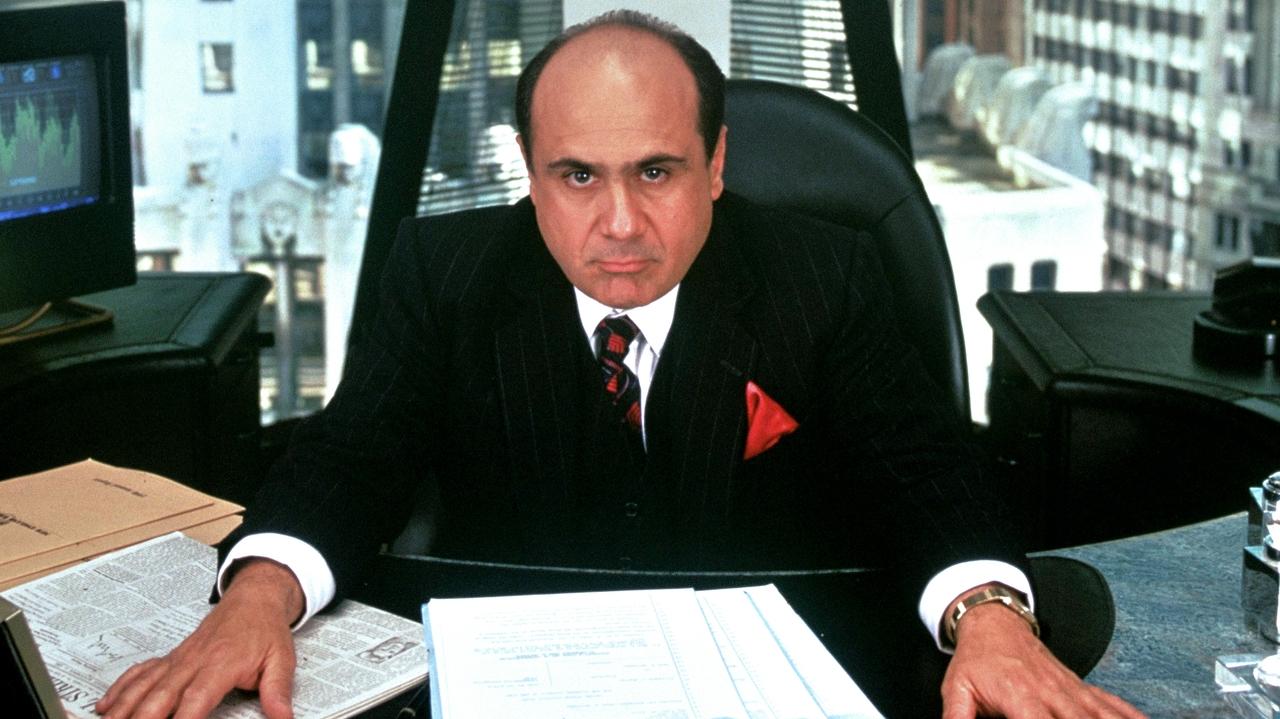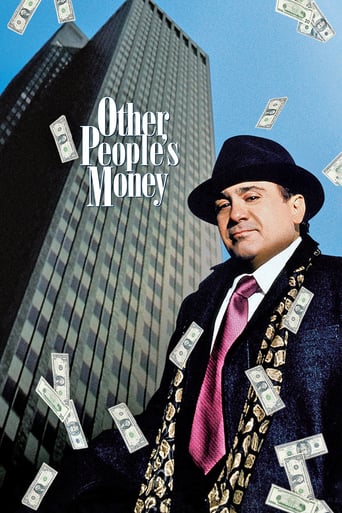

What a waste of my time!!!
... View MoreExcellent, Without a doubt!!
... View MoreBlending excellent reporting and strong storytelling, this is a disturbing film truly stranger than fiction
... View MoreClose shines in drama with strong language, adult themes.
... View MoreLarry Garfield (Danny Devito), is a corporate raider, deconstructing and selling off failing companies for prophet. Short and egotistical donut popping Larry or as his adversaries call him "Larry The liquidator", has his eye on buying out a New England based cable and wire company. This small town company employs most of it's residence. Owner in the autumn years the infamous Gregory Peck as Andrew Jorgenson and his wife Bea (Piper Laurie).Short and pudgy Garfield travels to Rhode Island and enters the factory and already complains about too many stairs but explains that a buy out is more wise than staying barely afloat. Jorgenson demands that he leaves the premises but the reality is there . Enter Stepdaughter/business attorney Kate Sullivan (Penelope Ann Miller). Smart, elegant yet feisty as Jorgenson has a plan to have Kate captivate the money hungry Larry and have him change his mind about swaying the stockholders. Jorgenson was right about Larry being smitten with Kate but as far as business goes Larry is not budging. Wife Bea makes a special trip to Larry's Manhattan headquarters offering one million dollars in greenmail to go away but Larry kindly tells the desperate woman, "I don't take money from widows and orphans." Meanwhile the company's President Bill Coles,(Dean Jones) is fearful of a company takeover forcing him into unemployment with no severance, offers his vote of the shares in Garfield's favor for one million dollars but only if the share make up the margin of victory.In that case he'll receive half. The dyes have been cast and the final showdown at the plant will take place. Iconic Gregory Peck's plea to keep the company afloat and little loud mouth Danny DeVito making sense of a changing economy telling the stockholders to invest in something else. Norman Jewison magic hasn't lost it's luster as DeVito and Peck work well together. Love the failed courtship between Devito and Miller as well. I thought this was a great vehicle for Danny DeVito in one of his most finest performances in his long and interesting career. Alvin Sargent's screen writing is superb as the rebuttal scenes at the plant are priceless . The two actors with their cadence and mannerism make the scenes so real. I give this movie half a dozen donuts out of ten.
... View MoreOther People's Money is a wonderful movie, full of smart dialogue, good music, and a terrific Danny De Vito performance. De Vito is his usual funny, and easy-going self, while Gregory Peck is a strong-willed patriarch. Very good stuff there. The weakest performance is from Penelope Ann Miller, who isn't really convincing as the corporate attorney, but the material is so good that it saves the movie. The movie, above all, presents a balanced take on a fascinating issue: is the hostile corporate takeover an evil act? Although one could argue that a sub-textual ideology is present- in fact, in many ways, the script can be considered a yuletide cautionary tale written by Dickens sans the spectral spirits- it can easily be dismissed; there is never a feeling that the viewer is being spoofed one propaganda or another. The soliloquies rendered by Jorgenson and Garfield at the end form the killer application of the piece. They deliver two diverse, diametrically opposed filters on the same subject, and both participants challenge all of us to come up with a sane, informed opinion regarding it.What's refreshing about the movie is the writer didn't set up a straw man to argue either point view. Both sides present intelligent arguments from believable characters. The movie challenges us that what is rational is not always what feels good. An efficient and productive economy is one that has the ability to change, but there are costs - people get displaced. Where the script fell short and where many in our society lose perspective is that while businesses may die out people are flexible. One's skills can be revamped and applied to more productive pursuits. Instead, however, the scriptwriters concoct a not so believable happy ending. Still, though Other People's Money is probably one of the most honest movies to come out of Hollywood on the topic of capitalism.Overall rating: 9 out of 10.
... View MoreDanny DeVito gives one of his most entertaining performances as the asset-stripper from hell. The movie is a fairly predictable Hollywood cocktail of comedy, morality and romance, but is raised above the ordinary by DeVito's performance and a thought-provoking script. DeVito has found a metal-bashing firm that is down on its luck. There's more money to be made from buying it up, selling off the assets and closing it down, than there is from keeping it going. That's the short-term corporate-raiders' view anyway. Trouble is; the firm employs lots of people whose livelihoods depend on their regular pay-cheques. It's a family-run factory that is practically the sole employer in a one-horse town. It's owner - played by a suitably fading Gregory Peck - knows this, and feels a moral responsibility towards the workforce that goes beyond simply maximising profits. He sees the staff every day. He knows many personally and understands their daily struggles.The conflicting arguments are well presented at an extraordinary shareholders' meeting. Many questions are raised about the purpose of capitalism in a supposedly civilised society. Does a business exist merely to enrich those who invest in it, or do shareholders enter into a covenant of obligation towards those who labour in their name? DeVito comes over more as a likable rogue than a true speculator, which was probably necessary to satisfy the comedic elements of the movie. He is shown as frivolous and playful towards his own staff. Whereas in truth, he would be unlikely to offer anything like such an avuncular stance. His sting is partially pulled by a female business lawyer employed by Peck. A romantic under-current develops between her and DeVito, which she typically attempts to exploit.The movie has some good gags, and some excellent moments that are both skilfully acted and funny. Yet the fundamental questions about capitalism remain unanswered, and the summation is unsatisfactory. Perhaps there is no easy answer. The ending is something of a cop-out that attempts to deliver a feel-good infusion. Probably 99 times out of a hundred, the result would be a disaster for the workforce, but so much reality would compromise the other elements of the play.It's well worth a watch for whatever motivates you.
... View MoreAbout halfway through this film, I would have said that Danny DeVito's character of Lawrence Garfield was running a better than even chance of becoming the second assassinated Garfield in American history. But in the end he becomes with all its and his defects, the great spokesman for American capitalism. In fact you have to go back to John Wayne's McLintock to hear the system so well defended.DeVito is a Wall Street speculator who has earned the title of 'Larry the Liquidator' for his uncanny ability to spot in trouble companies take them over and liquidate them of all their tangible assets at a profit to himself and his investors. He's got his eyes on a company right now in the Rhode Island based New England Cable&Wire.Running the company is Gregory Peck who is the son of the man who founded it and it's the typical employer in a one company small town. Peck is his usual decent man who feels a responsibility to the workers and to the town which would just go belly up should his plant close down.Written fifty years ago and directed by Frank Capra, the film would have had the hero Peck triumphing over the evil gnome DeVito. Times have changed and the only way as William Holden so eloquently put it in Executive Suite for companies to survive is to grow. Research and keeping up with the latest technologies is the only way to go, a lesson Peck forgot. The Japanese have developed fiber optics, he's making a product for which there is less and less market.And that is the weakness of the system in America in 2008. No provision for retraining workers is made in too many places. Still it's better than Communism where job competency is replaced by knowledge of ideological nostrums. On the other hand Communism does have its advantages as DeVito says. All the lawyers are the ones liquidated first.Danny DeVito is an unpleasant looking man who is making people face some unpleasant truths. That's the strength of Other People's Money and why this is such a worthwhile film.
... View More